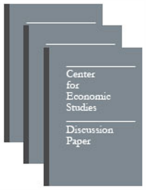Understanding Criminal Record Penalties in the Labor Market
Understanding Criminal Record Penalties in the Labor Market
Abstract
This paper studies the earnings and employment penalties associated with a criminal record. Using a large-scale dataset linking criminal justice and employer-employee wage records, we estimate two-way fixed effects models that decompose earnings into worker’s portable earnings potential and firm pay premia, both of which are allowed to shift after a worker acquires a record. We find that firm pay premia explain a small share of earnings gaps between workers with and without a record. There is little evidence of variable within-firm premia gaps either. Instead, components of workers’ earnings potential that persist across firms explain the bulk of gaps. Conditional on earnings potential, workers with a record are also substantially less likely to be employed. Difference-in-differences estimates comparing workers’ first conviction to workers charged but not convicted or charged later support these findings. The results suggest that criminal record penalties operate primarily by changing whether workers are employed and their earnings potential at every firm rather than increasing sorting into lower-paying jobs, although the bulk of gaps can be attributed to differences that existed prior to acquiring a record.
Others in Series
Working Paper
Working Paper
Working Paper




